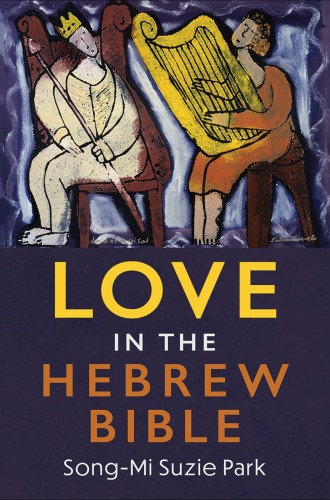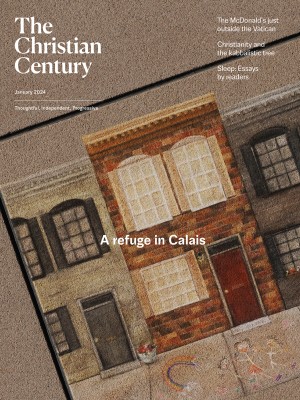In the Hebrew Bible, love is complex
Song-Mi Suzie Park shows that ahav is dense, powerful, political, and divine.
What is love? It’s a simple question that writers and artists have asked repeatedly through the centuries, from Bernard of Clairvaux and Mildred Bangs Wynkoop to Tina Turner and Haddaway. It’s also the question that biblical scholar Song-Mi Suzie Park explores in her excellent new book.
Often, we approach love, whether secularly or theologically, through the Greek concepts of philia, eros, storge, and agape. Some ministers anachronistically use those words to describe love in the Hebrew Bible; others mistakenly believe that hesed is the only Hebrew word for love in scripture. As a corrective, Park focuses on the verb ahav and its corresponding noun, ahahav, which appear nearly 250 times in the Hebrew Bible.
Read our latest issue or browse back issues.
The etymology of ahav is unclear. The term is often used metaphorically, connecting individuals’ specific backgrounds, emotions, and experiences with something that cannot be measured or diagrammed. Park writes: “Love, ahav, is depicted as a dense term and concept that has a web of associations, meanings, and connections—and it is this dense consortium of meanings that is evoked when ahav is used and appears in a particular narrative.” Noting that ahav is associated with men far more than with women, Park describes it as a “divine, powerful, painful, mysterious, and ultimately feminine force that might be on par with God.” In each chapter of the book, Park utilizes a different biblical narrative to define and shape our understanding of ahav.
She contextualizes ahav by focusing on the relationship between the Israelites and God in Deuteronomy. This relationship is based solely on the covenant God makes with Moses and the people of Israel after the exodus from Egypt. Park demonstrates that the Deuteronomic covenant has the same components as other Near Eastern treaties of that era: a preamble, stipulations, provisions, witnesses, and blessings and curses.
At first glance, such a covenant may seem more contractual than loving. But throughout the Bible’s covenantal narrative, Park shows, ahav manifests as action and obedience. To love in this regard is to pledge allegiance and loyalty to God. Even when we think of love as an emotional concept, Park writes, we recognize that it is not based solely on feeling. She brings Jewish scholar Jacob Neusner into the conversation, noting his claim that emotions in Judaism “are not seen as spontaneous but as an aspect of a person’s judgment.” She quotes Neusner: “Our task as human beings demands that we sanctify our emotions as much as carry out actions of holiness.”
In the Hebrew Bible’s narratives, Park shows, love is political, theological, familial, and social. She takes readers through various relationships, including Jacob and Esau, David and Saul, and David and Jonathan. Each of these relationships symbolizes a different type of love, thus adding another layer to the complexity of ahav. The hardest part of understanding how love operates in the Hebrew Bible, readers discover, is that it changes with every narrative.
Park highlights the complexity in the relationship between Jacob and Esau. The two are born into opposition, which shapes not only how they interact with one another but also how their parents interact with them. Each parent loves one son more than the other, demonstrating hierarchical love—and this hierarchy complicates how the characters understand love from God. Park identifies two kinds of love in this narrative: “Lofty, celestial love connected to God; and a baser, animal-like love centered on appetites and bodily desires. Through this juxtaposition, the story asserts the supremacy of the loftier kind of love by connecting it to God’s preferences and plans.”
Park deftly weaves together historical facts and myths, adding layers of cause and understanding to textual formation, particularly around the behaviors of the central figures. For example, when considering the opposition between Jacob and Esau, she notes that in Greco-Roman mythology, twins were associated with both animals and divine beings. It was commonly thought that if a woman bore twins, she had been impregnated by two fathers: one human and the other a deity. This belief created the conditions for preferential treatment of the twin whose father was thought to be divine.
In the case of Saul and David, the narrative that defines love revolves around power and political play. While God appoints Saul to the throne in a mysterious way, it only happens after the Israelites’ constant rejection of God as their sovereign. In the same mysterious way that Saul is appointed, he is then rejected by God and falls in love with the one who will usurp him. Park asserts that while love in this narrative is about power and politics, it is also about pain. What we see through God’s mysterious actions in this story is a God who is pained after being rejected by the people. This heartbroken God allows individuals (such as Saul) to feel the same kind of painful love. “God might not just be a victimizer of love, but might also be its victim,” Park writes.
David and Jonathan share yet a different type of love, although Park makes it clear that she’s not highlighting the erotic dimensions of love that many have seen in David and Jonathan’s relationship. Rather, she highlights a love that is complicated and ambiguous. David makes Saul’s children fall deeply in love with him in order to create a bond greater than the bond between the children and Saul.
It is common for words in biblical Hebrew to carry multiple meanings. When it comes to ahav, there is no easy answer to the question “What is love?” (or to the related question “Who is love?”). Park shows how the biblical narratives suggest that love might be its own entity, perhaps even one that has authority over God. In the Hebrew Bible, Park demonstrates, love is “fraught and complicated.” It is “neither one thing or another, but instead is irreducible, everchanging, mysterious, and ultimately unknowable.”







